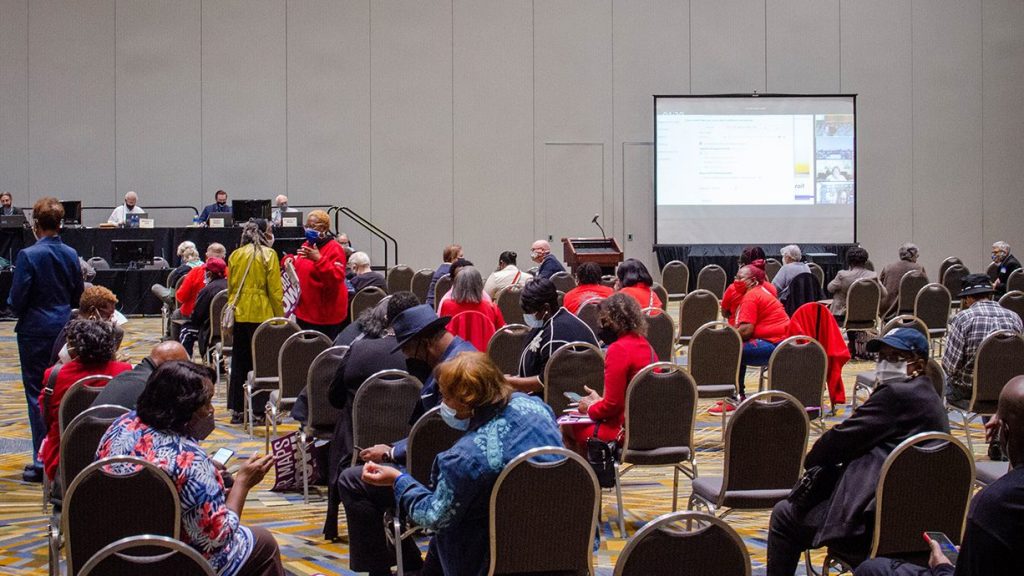Redistricting commission hears Voting Rights Act report, approves plan for new map submissions
Colin Jackson January 30, 2024At a meeting on Monday, the commission approved a plan for submitting maps for public comment.

Members of the public voice concerns during a Michigan Independent Citizens Redistricting Commission's public hearing at TCF Center in Detroit, Oct. 20, 2021.
Michigan’s redistricting commission should aim for at least 11 state House districts around metro Detroit that give a minority community a fair shot at electing its candidate of choice, according to a Voting Rights Act analysis of several potential redistricting plans by the commission’s Voting Rights Act counsel, Mark Braden.
Braden, at a Monday meeting of the commission, explained the number represented what he believed was the number of districts out of 25 metro Detroit boundaries analyzed where Black residents could reasonably make up most of the voters in a primary election.
“By definition, you have an opportunity to elect candidates of your choice if you’re more than 50% of the people who are actually voting in the election. Does it mean that your candidates win? No. But it means you have an equal opportunity by simple math,” Braden told the commission.
It marks a seeming departure from the logic of the group’s previous VRA counsel, Bruce Adelson. Under Adelson’s guidance, the commission drew several districts that were later rejected by a federal court. Adelson repeatedly told the commission that the data suggested Black voters didn’t need to make up the majority of a district’s voting-age population to elect a candidate of their choice.
The commission is redrawing the districts to comply with an order from the federal court, which found the maps violated the U.S. Constitution’s Equal Protection Clause.
Braden, in his analysis presented Monday, found only three of over a dozen new maps under consideration would comply with the Voting Rights Act by meeting those 11 district targets.
Braden said the commission could make some small tweaks to fix some of the others.
“If you can change it, moving the fewest number of people and affecting the fewest number of districts to get to 11, that’s the safest thing to do. That makes it easiest for me to defend,” Braden said.
The court’s opinion technically only struck down seven Michigan state House districts as unconstitutional.
The judges accused the commission of drawing them predominantly based on race. As a result, commissioners have been careful to avoid mentioning race or looking at racial data throughout the redrawing process up to this point.
But the commission had also been working from maps submitted by various groups, including Promote the Vote and the Institute for Public Policy and Social Research at Michigan State University.
Two of the maps found in compliance with the Voting Rights Act were based off the Promote the Vote submissions.
During the meeting, the commission ultimately voted to discard eight of those derivative maps out of concerns over whether any of the groups may have had race in mind while creating them. Those tossed included the Promote the Vote ones.
“In fact, I believe some of the groups who did submit maps to us that we were looking at have stated on the record that they did use race to create them,” Commission Chair Cynthia Orton said during Monday’s meeting.
Six collaborative and one solo-drawn map remained after the removal.
Any of the tweaking work on those to meet Voting Rights Act compliance must be finished by Friday. That’s when the maps will lock for a court-ordered public comment period.
At Monday’s meeting, the commission approved a plan for submitting maps for public comment.
Commission Attorney Nate Fink recommended against putting limits on how many of the seven remaining plans make it to the public comment period.
“Frankly, my inclination is the more the merrier. At this point, we can send them off, hear what the public thinks about the different maps. If there’s additional issues that are raised throughout the public comment period, it’ll be good to have a number of different maps to ultimately choose from,” Fink said.
The commission also chose a number of February meeting dates to take in public comment.
Trusted, accurate, up-to-date.
WDET strives to make our journalism accessible to everyone. As a public media institution, we maintain our journalistic integrity through independent support from readers like you. If you value WDET as your source of news, music and conversation, please make a gift today.
